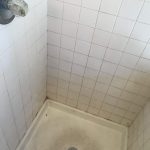What’s Sanded Caulking and Why Is it Bad?
There are a variety of different sealant products used throughout your home. One of these is caulk. More often than not, it is used to fill and seal joints. It can be made of acrylic, silicon, or latex. Sometimes, sand is added to caulk to give it more bulk so that it can fill larger joints.
Common Uses of Grout
Caulk is commonly used in bathrooms and kitchens to seal counters, bathtubs, and counters. Recently, in an effort to save money, some places have been using sanded caulk in showers and around sinks, tubs, and counter tops. Unfortunately, this can lead to problems in the future.
Sanded caulk doesn’t have a lot of flexibility. Therefore, it can crack and fall out when pressure is applied to an area. This can occur when a person continuously steps in and out of their shower or bathtub or applies pressure to the counter top, such as leaning on it.
 In addition to not being flexible, sanded caulk is also not mold resistant. The bathroom is a place where there’s a lot of moisture and warmth—the perfect conditions for growing mold. Having mold in your home can lead to a variety of health issues, not to mention it’s unsightly and has an unpleasant odor. Preventing it from growing in your bathroom is a must, but it can’t be accomplished with sanded caulk. That job has to be left to silicone caulk.
In addition to not being flexible, sanded caulk is also not mold resistant. The bathroom is a place where there’s a lot of moisture and warmth—the perfect conditions for growing mold. Having mold in your home can lead to a variety of health issues, not to mention it’s unsightly and has an unpleasant odor. Preventing it from growing in your bathroom is a must, but it can’t be accomplished with sanded caulk. That job has to be left to silicone caulk.
Types of Silicone Caulk
There are a variety of different types of silicone caulk, and they are more beneficial to use in the bathroom than sanded caulk. Silicone caulk is incredibly flexible and resistant to moisture and chemicals, all things that your bathroom is often exposed to. It creates a strong bond that won’t easily break or crack, and it won’t allow mold growth.
Make sure your bathroom is being sealed properly and with the right products. Talk to a professional if you have any questions or concerns about the type of caulk that was used to seal your bathroom.
The professionals at The Grout Specialist are here to answer your questions. Contact us today!




